Entry-Level Production Assistant Cover Letter
Subject: Application for Production Assistant Position
Dear [Hiring Manager's Name],
I am writing to express my enthusiastic interest in the Production Assistant position at [Company Name]. As a recent graduate with a degree in Media Studies and hands-on experience through internships at local television stations, I am eager to contribute to your production team.
During my internship at [Previous Company], I assisted with set preparation, equipment management, and coordinated schedules for multiple shoots. I developed strong organizational skills and learned to thrive in fast-paced environments where attention to detail is crucial. My experience operating cameras, managing audio equipment, and assisting with post-production tasks has prepared me well for the demands of this role.
I am particularly drawn to [Company Name] because of your commitment to innovative storytelling and quality production. Your recent work on [specific project] demonstrates the creative excellence I aspire to be part of. I am confident that my technical skills, adaptability, and passion for media production make me an ideal candidate for this position.
I would welcome the opportunity to discuss how my background and enthusiasm can contribute to your team. Thank you for considering my application.
Sincerely,
[Your Name]
[Phone Number]
[Email Address]
Experienced Broadcast Journalist Career Transition Letter
Subject: Senior Correspondent Position - [Your Name]
Dear [Hiring Manager's Name],
With over eight years of experience as a broadcast journalist covering national politics and breaking news, I am writing to apply for the Senior Correspondent position at [Company Name]. My track record of delivering compelling stories under tight deadlines and my established network of sources position me to make immediate contributions to your news team.
Throughout my career at [Current/Previous Company], I have reported on major events including three presidential elections, natural disasters, and international conflicts. I have conducted over 500 on-camera interviews, filed daily reports for both television and digital platforms, and mentored junior reporters in investigative techniques. My work has earned two regional Emmy nominations and a Edward R. Murrow Award for investigative reporting.
I am seeking to transition to [Company Name] because your organization's commitment to in-depth journalism and global coverage aligns with my professional values. I am particularly impressed by your recent investigative series on [specific topic], which exemplifies the type of meaningful journalism I want to continue producing.
My expertise in multimedia storytelling, combined with my ability to cultivate sources and break exclusive stories, would strengthen your news division. I would appreciate the opportunity to discuss how my experience can serve your editorial mission.
Thank you for your consideration.
Best regards,
[Your Name]
[Phone Number]
[Email Address]
Creative Broadcasting Freelancer Pitch Email
Subject: Freelance Video Producer Available for Upcoming Projects
Hi [Contact Name],
I hope this message finds you well! I'm reaching out because I've been following [Company Name]'s amazing content, especially your recent documentary series on [topic]. The storytelling approach you took was absolutely brilliant, and it's exactly the kind of work that gets me excited.
I'm a freelance video producer and director with five years of experience creating content for networks, streaming platforms, and digital media companies. My specialty is turning complex subjects into engaging visual narratives that resonate with diverse audiences. I've recently wrapped up a project with [Previous Client] and have availability starting [Date].
Here's what I bring to the table: full-cycle production management, a killer eye for cinematography, strong editing skills (Premiere Pro and DaVinci Resolve), and a collaborative spirit that makes productions run smoothly. I've produced everything from 30-second social media spots to hour-long documentaries.
I'd love to grab coffee (virtual or in-person!) to discuss potential collaboration opportunities. I think there's real synergy between what you're creating and what I love to produce.
Looking forward to connecting!
Cheers,
[Your Name]
[Portfolio Link]
[Phone Number]
Broadcasting Executive Internal Promotion Application
Subject: Application for Director of Programming Position
Dear [Executive Name],
I am writing to formally express my interest in the Director of Programming position. Having served as Senior Programming Manager for the past four years, I have developed a comprehensive understanding of our network's audience, strategic priorities, and competitive landscape.
During my tenure, I have successfully managed the scheduling and acquisition of content that increased our prime-time viewership by 23% and improved our demographic reach among the 25-54 age group. I led the team that launched our successful weekend programming block, which now generates $2.3 million in annual advertising revenue. Additionally, I have cultivated strong relationships with content producers, negotiated favorable licensing agreements, and mentored three team members who have advanced to management positions.
As Director of Programming, I would focus on three key priorities: expanding our original content slate to differentiate our network in an increasingly competitive market, leveraging data analytics to optimize our scheduling strategy, and developing innovative cross-platform programming that engages viewers across multiple touchpoints.
My institutional knowledge, proven track record of results, and strategic vision for the future make me well-suited for this leadership role. I am deeply invested in our network's success and would be honored to contribute at this higher level.
I would welcome the opportunity to discuss my qualifications and vision for the department in greater detail.
Respectfully,
[Your Name]
[Current Title]
[Internal Extension]
Radio Broadcasting Personality Application Letter
Subject: Morning Show Host Position - [Your Name]
Dear [Station Manager's Name],
Your energy fuels my morning drive. That's what listeners should feel about their radio station, and that's exactly what I want to create as your next Morning Show Host at [Station Name].
I've been waking up cities for six years, most recently hosting "The Morning Buzz" on [Current Station] where we grew our audience share by 34% and became the number-one morning show in our market among 18-34 year-olds. My approach combines genuine conversation, pop culture savvy, community engagement, and music that people actually want to hear before their first coffee kicks in.
What makes a great morning show? Authenticity. Listeners can smell a fake personality from miles away. I bring real talk, real laughs, and real connections with the audience. I've conducted over 200 celebrity interviews, hosted live broadcasts from community events, and created viral social media moments that extend our reach beyond the FM dial. My segments on [topic] became podcast spinoffs with 50K downloads monthly.
[Station Name] has an incredible legacy in this market, and I see tremendous opportunity to revitalize your morning slot with fresh energy while respecting your brand identity. I understand your audience, I know this market, and I'm ready to make mornings matter again.
Let's talk about how I can drive ratings and revenue for your station. I promise it'll be more fun than a Monday morning should be.
Rock on,
[Your Name]
[Phone Number]
[Email Address]
[Social Media Handles]
Technical Broadcasting Engineer Formal Application
Subject: Application for Chief Broadcast Engineer Position
Dear [Hiring Manager's Name],
I am writing to apply for the Chief Broadcast Engineer position at [Company Name]. With 12 years of experience in broadcast engineering, extensive expertise in RF systems, digital transmission technologies, and facility infrastructure, I am prepared to oversee the technical operations of your broadcasting facilities.
My qualifications include:
• SBE Certified Professional Broadcast Engineer with specialization in television engineering
• Comprehensive experience with ATSC 3.0 implementation, IP-based workflows, and cloud production systems
• Proven track record managing technical staff, coordinating complex installations, and maintaining FCC compliance
• Expertise in emergency broadcast systems, transmitter operations, and network infrastructure
In my current role as Senior Broadcast Engineer at [Current Company], I managed the complete transition from SDI to IP-based production infrastructure, resulting in a 40% reduction in equipment costs and significantly improved workflow efficiency. I have maintained 99.97% uptime for mission-critical broadcast systems and successfully managed technical operations during major live events including political debates and breaking news coverage.
I am particularly interested in this position because of [Company Name]'s investment in next-generation broadcast technology and commitment to technical excellence. My engineering philosophy emphasizes preventive maintenance, staff development, and strategic technology planning to ensure reliable operations and prepare for future industry developments.
I have attached my resume, certifications, and references for your review. I would appreciate the opportunity to discuss how my technical expertise and leadership experience can benefit your organization.
Thank you for your consideration.
Sincerely,
[Your Name]
[Professional Certifications]
[Phone Number]
[Email Address]
Sports Broadcasting Position Cover Letter
Subject: Sports Anchor/Reporter Application
Dear [News Director's Name],
"It's good!" might be the call heard round the stadium, but "They hired the right person!" should be what you're thinking after reading this letter. I'm applying for the Sports Anchor/Reporter position at [Station Name], and I'm ready to bring energy, expertise, and storytelling to your sports desk.
I've covered everything from high school football to professional championships during my five years in sports broadcasting. Currently, I'm the weekend sports anchor at [Current Station] where I produce, shoot, write, and deliver sports content across multiple platforms. My highlight reels aren't just game recaps—they're stories about athletes, communities, and the moments that make sports matter beyond the scoreboard.
What sets me apart:
• I can shoot and edit my own content (essential in today's multi-platform environment)
• Strong play-by-play and color commentary experience for live game broadcasts
• Deep connections with local coaches, athletic directors, and sports information directors
• Social media presence with 15K followers who engage with my sports coverage daily
• Equally comfortable covering major professional sports and local high school athletics
[Station Name] has a reputation for sports coverage that goes beyond the highlights, and that's exactly the kind of journalism I practice. Whether it's a feature on a scholar-athlete overcoming adversity or breaking down playoff implications, I tell stories that resonate with sports fans and casual viewers alike.
I would love to discuss how I can contribute to your sports team. I'm available for an interview at your convenience and can provide an audition reel upon request.
Thank you for considering my application.
Best,
[Your Name]
[Phone Number]
[Email Address]
Broadcast News Director Executive Position Letter
Subject: News Director Position - Strategic Leadership for [Station Name]
Dear [General Manager's Name],
Leadership in broadcast journalism requires balancing editorial excellence with business acumen, fostering talent while delivering results, and maintaining journalistic integrity in an evolving media landscape. I am writing to apply for the News Director position at [Station Name] because I have successfully navigated these challenges throughout my 15-year career in broadcast news leadership.
As Assistant News Director at [Current Station], I oversee a team of 45 journalists and manage a $4.2 million annual budget. Under my leadership, we have achieved:
• 18 consecutive months as the number-one rated newscast in our market
• Three regional Edward R. Murrow Awards for investigative reporting and breaking news coverage
• 27% increase in digital engagement through strategic social media and website initiatives
• Successful launch of a streaming news channel that generates 2 million monthly views
My management philosophy emphasizes collaboration, innovation, and accountability. I have modernized our newsroom workflows, implemented multimedia journalism training, and created a culture where journalists are empowered to pursue meaningful stories while meeting the demands of 24/7 news cycles.
[Station Name] has a distinguished history of community service and journalistic excellence. I am prepared to build upon that legacy by developing talent, strengthening community connections, pursuing impactful investigative journalism, and adapting to technological changes that are reshaping our industry.
I have attached my resume and would welcome the opportunity to discuss my vision for the news department and how my leadership experience aligns with your station's goals.
Respectfully submitted,
[Your Name]
[Current Title]
[Phone Number]
[Email Address]
What Are Media and Broadcasting Cover Letters and Why Do You Need Them
Media and broadcasting cover letters are professional documents that accompany job applications in television, radio, streaming media, podcasting, and related industries. These letters serve as your first opportunity to demonstrate your communication skills—ironically fitting, since effective communication is the foundation of broadcasting careers.
Why they matter in this industry:
- Broadcasting is highly competitive with many qualified candidates for limited positions
- Your cover letter showcases your writing ability, which is crucial for most media roles
- They allow you to explain gaps in employment or career transitions common in freelance-heavy industries
- Hiring managers in media need to see personality and voice, not just credentials
- They provide context for your reel, portfolio, or work samples
- In creative fields, a compelling narrative about your career can differentiate you from equally qualified candidates
When to Send Media and Broadcasting Cover Letters
Job Application Scenarios:
- Applying for staff positions at networks, stations, or production companies
- Seeking freelance or contract work with new clients
- Responding to advertised openings for on-air talent positions
- Pursuing internal promotions or lateral moves within your organization
- Transitioning between different media sectors (print to broadcast, radio to television, etc.)
Networking and Speculative Applications:
- Reaching out to industry contacts about unadvertised opportunities
- Following up after meeting someone at industry conferences or events
- Expressing interest in companies undergoing expansion or launching new programs
- Seasonal hiring periods (typically before major programming changes in fall and spring)
Career Development Moments:
- After completing significant projects that enhance your qualifications
- When relocating to a new market and seeking positions
- Following industry recognition or awards that strengthen your candidacy
- When your current contract is ending and you're seeking the next opportunity
Who Should Send These Cover Letters
On-Air Talent:
- News anchors and reporters seeking positions at different stations or markets
- Radio personalities and DJs looking for better time slots or larger markets
- Sports broadcasters and commentators pursuing play-by-play or analysis roles
- Weather forecasters transitioning between markets or networks
Behind-the-Scenes Professionals:
- Producers, directors, and showrunners at all career levels
- Video editors, graphics specialists, and post-production professionals
- Technical staff including engineers, camera operators, and audio technicians
- Programming executives and content acquisition managers
Content Creators and Specialists:
- Journalists and investigative reporters
- Documentary filmmakers and storytellers
- Social media managers and digital content strategists
- Freelance videographers and production specialists
Career Changers:
- Professionals transitioning from related fields (journalism, film, marketing, corporate communications)
- Recent graduates entering the industry
- Military veterans with relevant technical or communications experience
Who Receives Media and Broadcasting Cover Letters
Direct Hiring Authorities:
- News directors who oversee newsroom hiring decisions
- Station managers and general managers with final approval authority
- Executive producers who build and manage production teams
- Programming directors who select on-air talent
Human Resources and Recruitment:
- HR departments at larger broadcasting companies and networks
- Talent acquisition specialists who screen initial applications
- Recruitment agencies specializing in media placements
Department Leaders:
- Chief engineers for technical positions
- Creative directors for design and graphics roles
- Sports directors for athletics-focused positions
- Digital content managers for streaming and online positions
Professional Contacts:
- Industry mentors who can forward your materials to decision-makers
- Former colleagues now working at target organizations
- Alumni networks from broadcasting or journalism programs
Requirements and Prerequisites Before Writing Your Letter
Research and Information Gathering:
- Study the station's or company's programming, audience demographics, and market position
- Review recent news about the organization (acquisitions, format changes, ratings performance)
- Understand the specific requirements and preferences mentioned in job postings
- Research the hiring manager's background and career path when possible
Materials Preparation:
- Have your demo reel, portfolio, or work samples ready to reference
- Update your resume to align with the position requirements
- Prepare specific examples of your work that demonstrate relevant skills
- Compile any awards, ratings achievements, or measurable results from previous roles
Professional Readiness:
- Ensure you have legitimate references who can speak to your work in broadcasting
- Verify your availability to start and any contractual obligations to current employers
- Confirm you're willing to relocate if the position requires it
- Have your social media presence reviewed and cleaned up—broadcasting employers will check
Technical Considerations:
- Know whether you're submitting via email, application portal, or mail
- Have appropriate file formats ready (PDF for letters, specific video formats for reels)
- Understand submission deadlines, especially for competitive positions
How to Write Effective Media and Broadcasting Cover Letters
Opening Strategy:
- Lead with a compelling hook that demonstrates your understanding of the industry
- Reference specific programming, recent station achievements, or industry trends
- Immediately establish your relevant experience and qualifications
- Show enthusiasm that feels genuine, not generic
Body Content Development:
- Provide concrete examples of your work with measurable results (ratings increases, award recognition, audience growth)
- Demonstrate industry knowledge and awareness of current broadcasting trends
- Address how your skills solve specific problems or fill needs the organization has
- Include relevant technical proficiencies (equipment, software, broadcasting systems)
- Mention any significant interviews, coverage, or projects that showcase your abilities
Closing Effectively:
- Express clear interest in next steps (interview, audition, portfolio review)
- Indicate your availability and flexibility
- Reference attached materials (resume, reel, work samples)
- Thank the reader professionally without being obsequious
Voice and Tone Considerations:
- Match your tone to the type of position (formal for executive roles, more energetic for on-air talent)
- Let your personality show through—broadcasting values authentic communication
- Avoid industry jargon that feels forced or excessive
- Proofread meticulously—errors are particularly damaging when applying for communication positions
Formatting Guidelines for Broadcasting Cover Letters
Length and Structure:
- Keep letters to one page (300-400 words maximum)
- Use 3-4 concise paragraphs rather than dense blocks of text
- Single-space with space between paragraphs
- Standard business letter format for mailed applications
Professional Presentation:
- Use clean, readable fonts (Arial, Calibri, Times New Roman in 10-12 point)
- Include complete contact information in the header
- Date the letter appropriately
- Use formal salutations when possible (avoid "To Whom It May Concern")
Tone Appropriateness:
- Executive and management positions: Professional, strategic, results-oriented
- Creative and production roles: Show personality while remaining professional
- On-air talent: Let your voice and energy come through
- Technical positions: Emphasize expertise and reliability
Digital Submission Considerations:
- Subject lines for emails should be clear and specific ("Application: Morning Anchor Position - [Your Name]")
- Include the cover letter in the body of the email AND as a PDF attachment
- Ensure all links to reels or portfolios are functional and up-to-date
- Keep file sizes reasonable for demo reels (under 25MB when possible)
- Use professional email addresses (no novelty addresses)
What to Do After Sending Your Application
Immediate Follow-Up Actions:
- Confirm your email was delivered (watch for bounce-backs)
- If using an application portal, verify your submission was completed
- Save a copy of everything you submitted for your records
- Note the date of submission for follow-up timing
Timeline for Follow-Up:
- Wait 7-10 business days before following up on most applications
- For time-sensitive openings or when specified, follow the given timeline
- Send a brief, professional email checking on the status of your application
- Avoid excessive follow-up (more than two follow-ups becomes counterproductive)
Staying Prepared:
- Keep your phone accessible and voicemail professional in case they call
- Be ready to provide additional materials if requested (extended reel, references, writing samples)
- Research common interview questions for broadcasting positions
- Prepare for potential auditions or screen tests if applying for on-air roles
Networking Maintenance:
- Connect with the hiring manager or recruiter on LinkedIn after applying
- Continue attending industry events and maintaining your professional network
- Update your portfolio or reel with new work while waiting for responses
- Apply to multiple positions rather than pinning hopes on one opportunity
Common Mistakes to Avoid
Content Errors:
- Sending generic letters that could apply to any station or company
- Failing to demonstrate knowledge of the organization's programming or market position
- Overemphasizing what you want from the job rather than what you offer
- Including irrelevant work experience that doesn't support broadcasting qualifications
- Making claims without providing specific examples or evidence
Presentation Problems:
- Typos, grammatical errors, or poor writing (devastating in communications careers)
- Inconsistent formatting or unprofessional appearance
- Using overly casual language in formal application contexts
- Excessively long letters that bury your key qualifications
- Forgetting to include essential contact information or submission materials
Strategic Missteps:
- Applying for positions you're clearly not qualified for
- Bad-mouthing current or former employers
- Revealing salary expectations prematurely
- Submitting outdated demo reels or portfolio materials
- Failing to tailor your letter to each specific position
Technical Issues:
- Broken links to online portfolios or reels
- Video formats that won't play on common platforms
- Excessively large file attachments that bounce back
- Unprofessional email addresses or social media handles
- Not following specific application instructions
Advantages and Disadvantages of Detailed Cover Letters
Advantages:
- Demonstrates strong writing skills essential for most broadcasting roles
- Provides context for career transitions or employment gaps
- Allows you to highlight specific achievements not obvious from resume
- Shows genuine interest in the specific organization
- Differentiates you from candidates who submit only resumes
- Gives hiring managers insight into your personality and communication style
- Creates opportunity to address potential concerns proactively
Disadvantages:
- Time-consuming to customize for multiple applications
- May not be read if hiring managers prioritize reels or resumes
- Can work against you if poorly written or containing errors
- Risk of over-explaining or providing unnecessary information
- Generic letters can harm your chances more than help
- Some organizations prefer brief introductory emails instead
- May be overlooked entirely in large applicant pools
Comparing Broadcasting Cover Letters to Other Application Materials
Cover Letter vs. Demo Reel:
- Cover letters provide context and narrative; reels provide visual proof of abilities
- On-air positions: reel is typically more important; production roles: balance may shift toward written materials
- Cover letters explain your range; reels demonstrate your current abilities
- Both should complement each other and tell a cohesive story
Cover Letter vs. Resume:
- Resumes list credentials; cover letters explain their relevance
- Cover letters allow personality; resumes emphasize facts
- Resumes follow standard formats; letters allow creative voice
- Both are necessary in most broadcasting applications
Cover Letter vs. Direct Email Pitch:
- Cover letters are more formal and comprehensive
- Direct emails work better for networking and freelance inquiries
- Cover letters suit traditional applications; emails suit informal connections
- Emails can be more conversational and immediate
Broadcasting Applications vs. Other Industries:
- Media applications often require demo reels/portfolios in addition to standard materials
- Personality and voice matter more in broadcasting than most fields
- Freelance and contract work is more common, requiring different application approaches
- Industry connections and referrals carry significant weight
- Market size and location are major factors in broadcasting careers
Essential Elements and Structure Components
Opening Elements:
- Professional header with your complete contact information
- Date of submission
- Recipient's name, title, and organization (research to get this right)
- Clear subject line or reference to the specific position
- Engaging opening paragraph that hooks the reader
Body Components:
- Professional background summary relevant to the position
- Specific examples of your work with measurable results
- Technical skills and industry-specific expertise
- Demonstrated knowledge of the organization and market
- Explanation of how your experience meets their needs
Closing Elements:
- Clear call to action (request for interview, audition, or portfolio review)
- Mention of attached or included materials (resume, reel, references)
- Professional closing statement
- Signature (typed for digital, handwritten for printed letters)
- Additional contact reminders if beneficial
Supporting Attachments:
- Resume tailored to the broadcasting position
- Demo reel or portfolio (provide link or note it's available upon request)
- Reference list if requested in posting
- Work samples for writing, producing, or reporting positions
- Any requested additional materials (writing tests, project examples)
Professional Tips and Industry Best Practices
Insider Strategies:
- Time your applications to arrive early in the week (Monday-Tuesday) for better visibility
- Reference specific programs, personalities, or coverage to show you actually watch/listen
- Mention mutual connections or professional associations when legitimate
- Keep a spreadsheet tracking where you've applied, when, and follow-up dates
- Customize your demo reel for each market or type of position when possible
Competitive Advantages:
- Highlight multilingual abilities—increasingly valuable in diverse markets
- Emphasize digital and social media skills alongside traditional broadcasting
- Showcase versatility across platforms (TV, radio, streaming, podcast)
- Mention willingness to work non-traditional hours (essential in broadcasting)
- Reference any experience with live broadcasting or breaking news situations
Industry-Specific Advice:
- For small markets: emphasize adaptability and willingness to wear multiple hats
- For large markets: highlight specialized expertise and specific achievements
- For network positions: demonstrate understanding of national audience and brand
- For digital media: showcase social media following, analytics knowledge, and engagement metrics
- For public broadcasting: emphasize mission alignment and community service
Professional Development:
- Mention ongoing education (workshops, conferences, certifications)
- Reference professional memberships (RTDNA, SPJ, NAB, etc.)
- Highlight awards or recognition that validates your work quality
- Show awareness of industry technology trends and willingness to learn
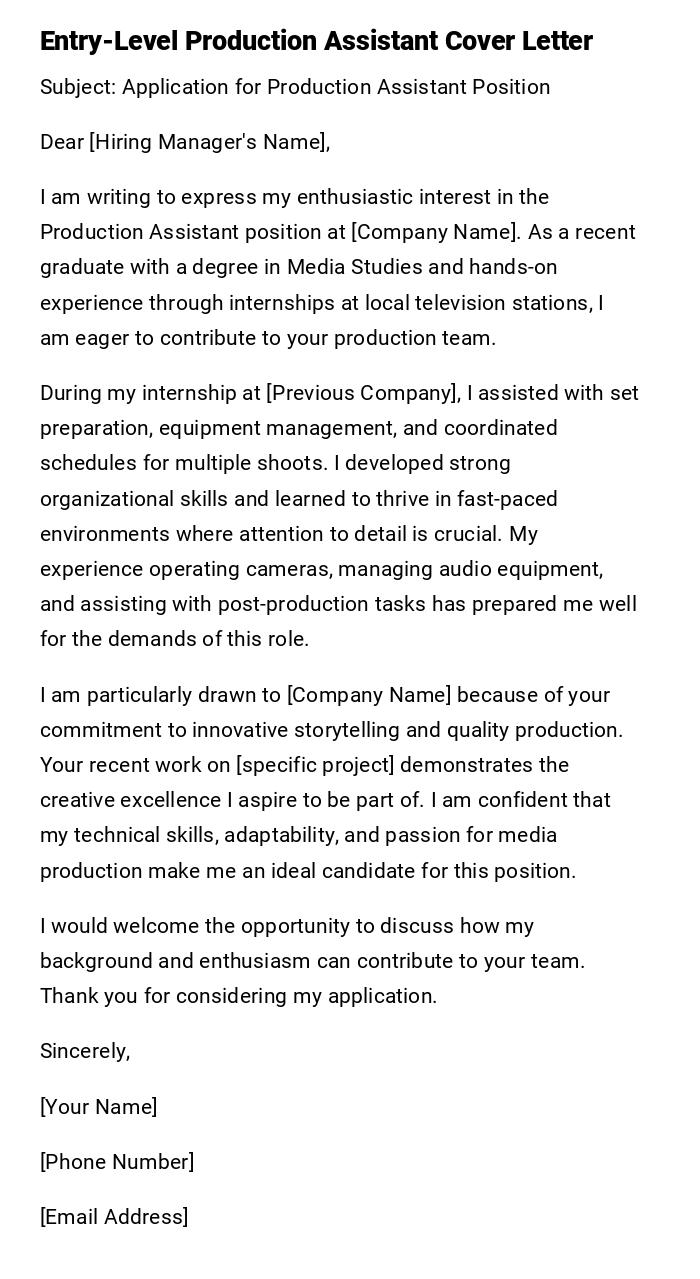
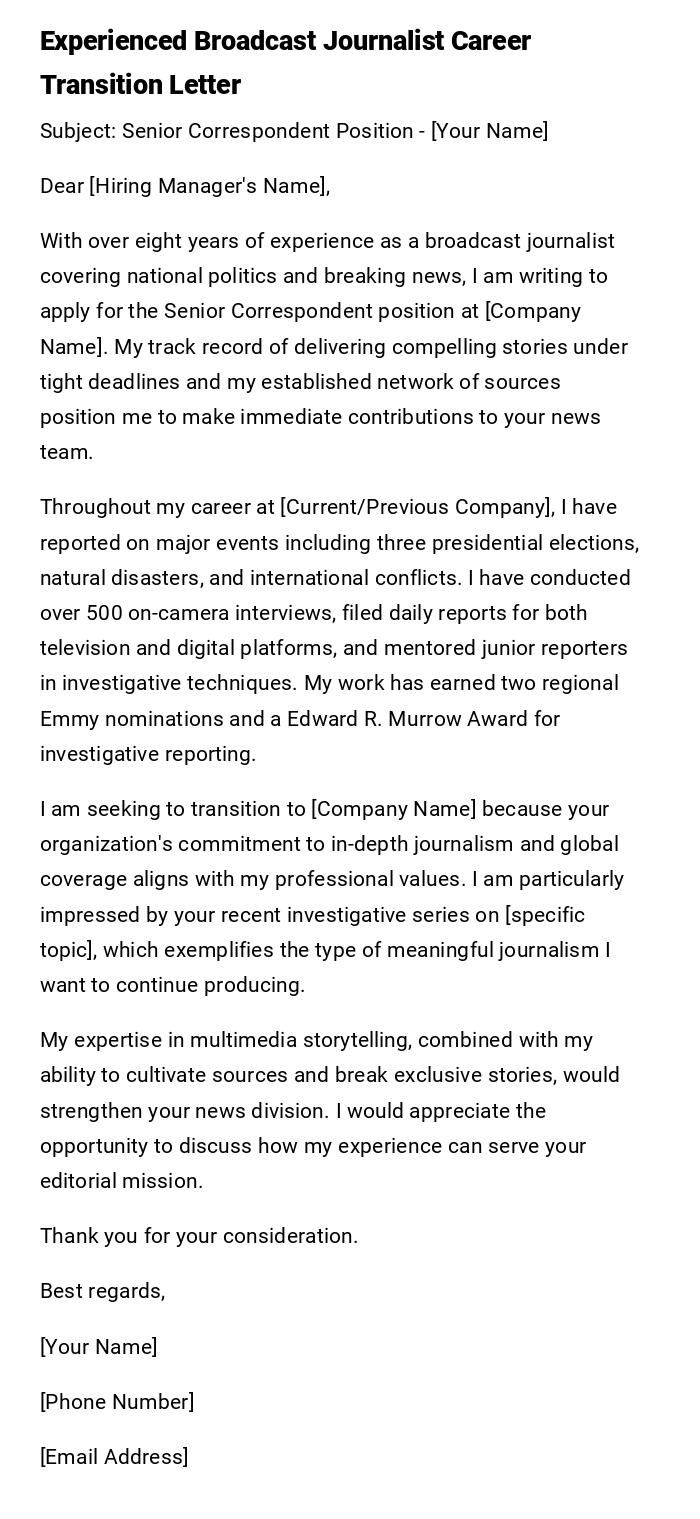
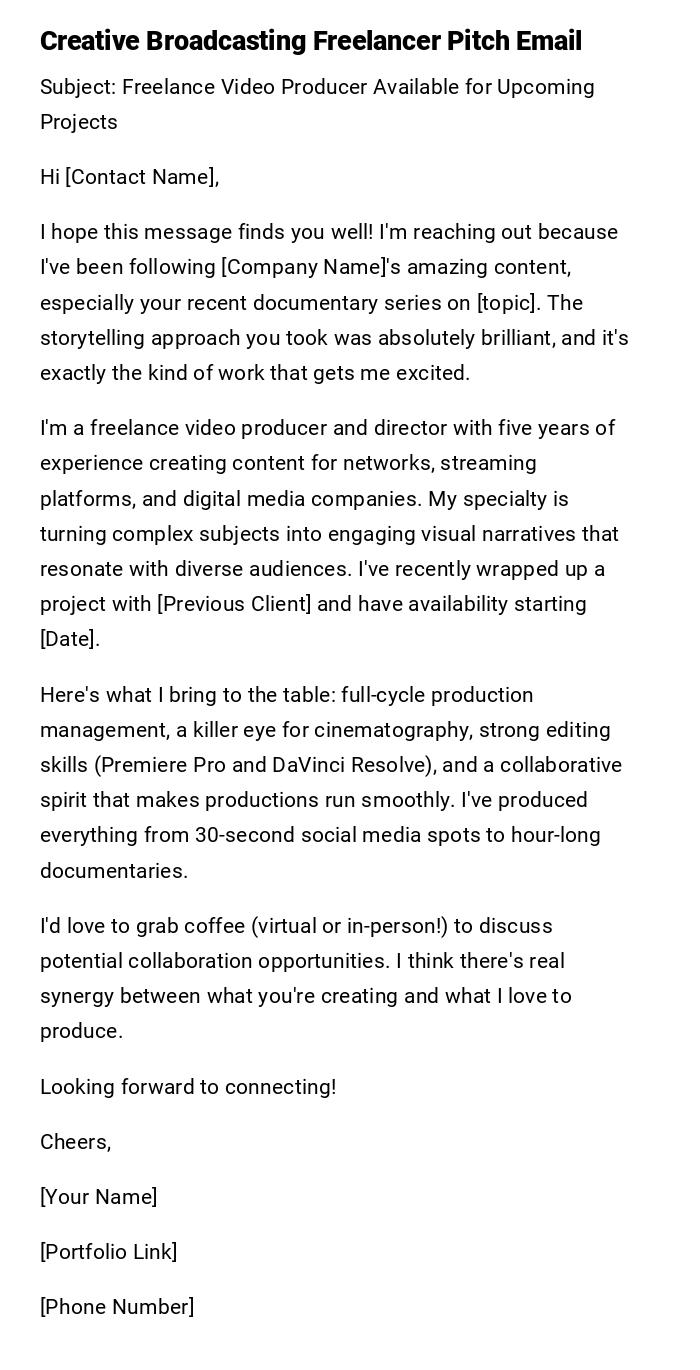
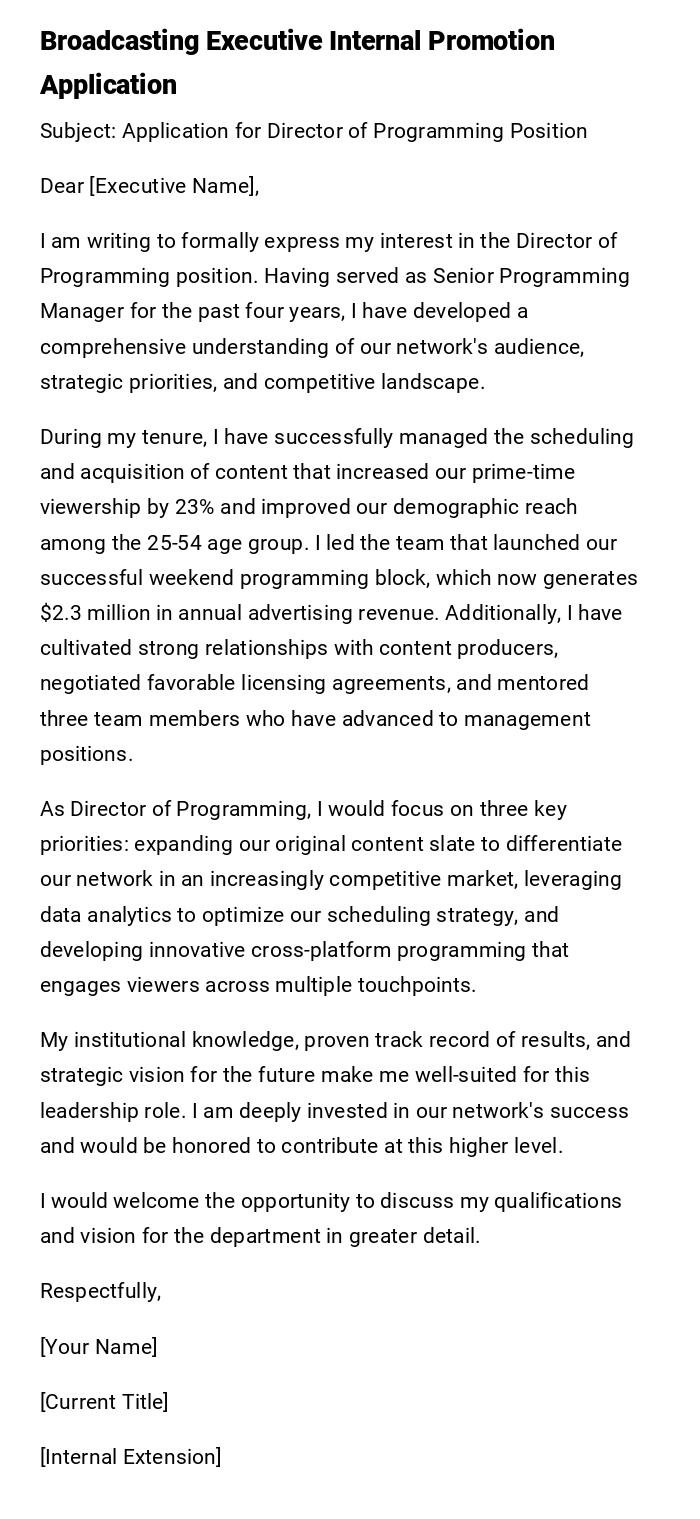
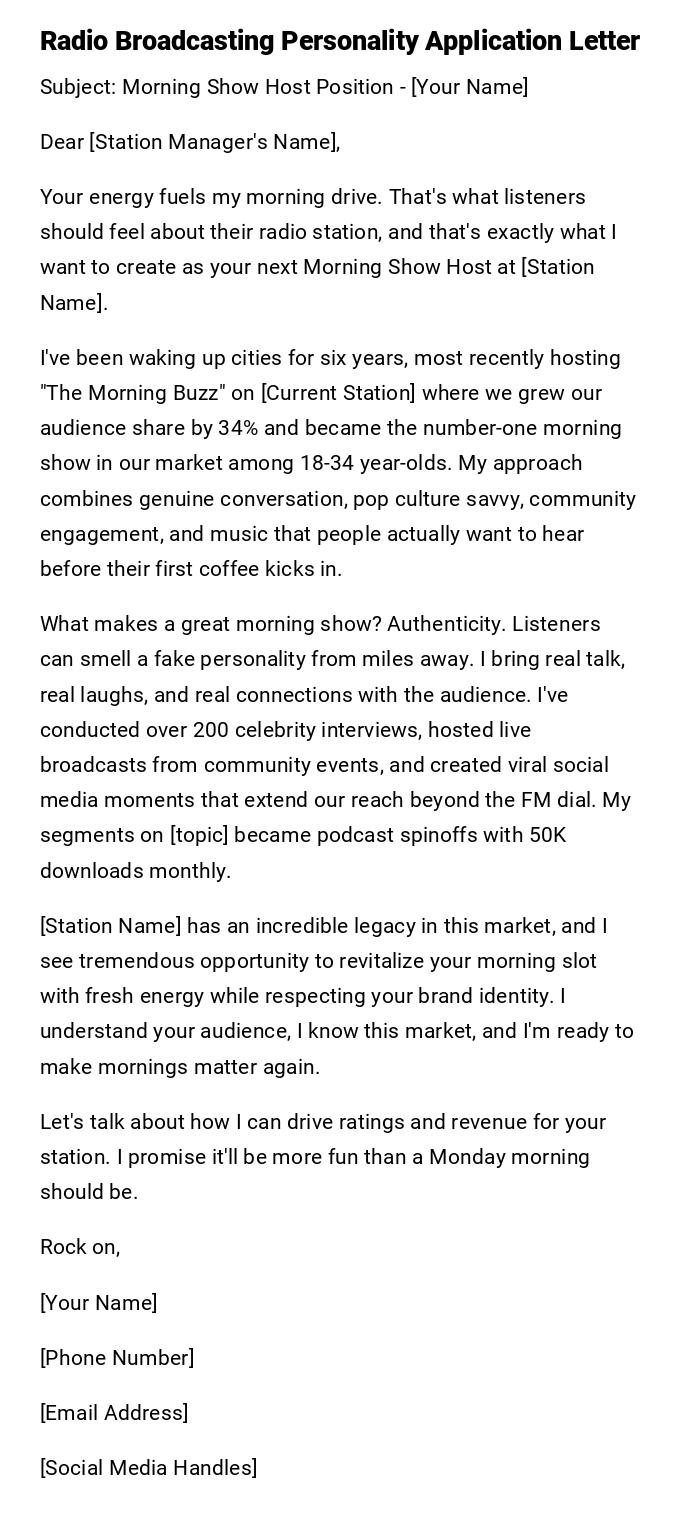
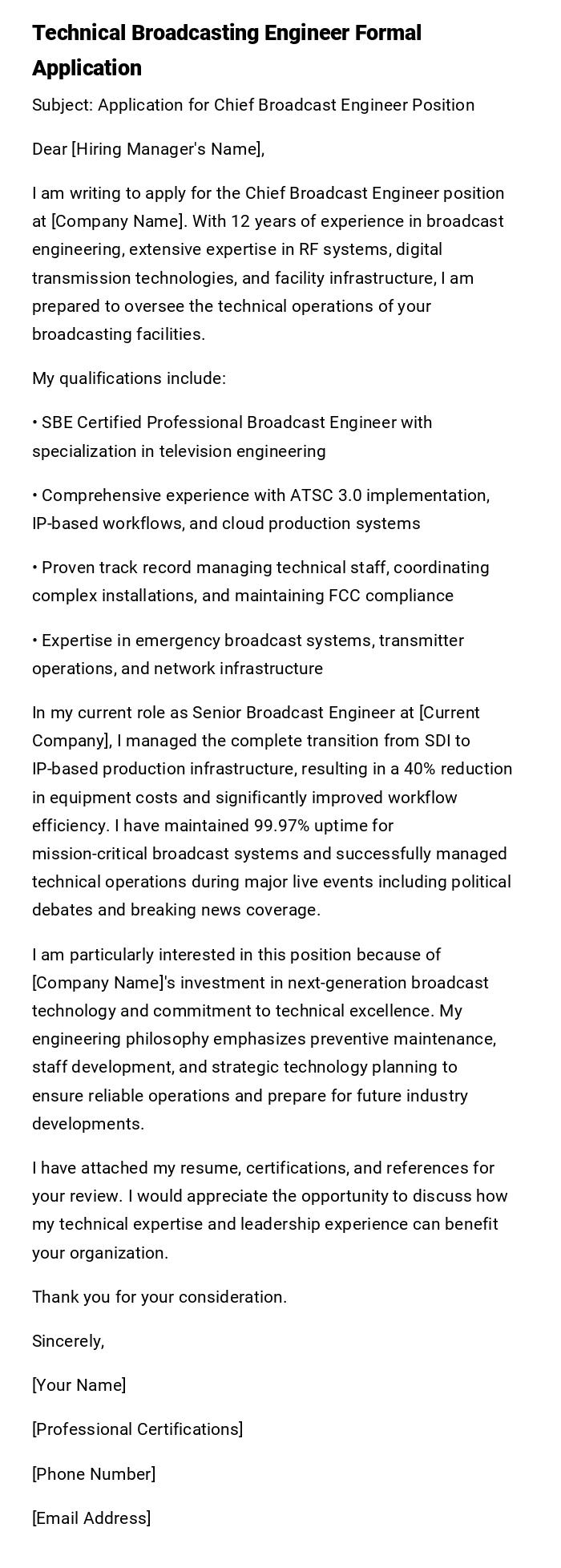
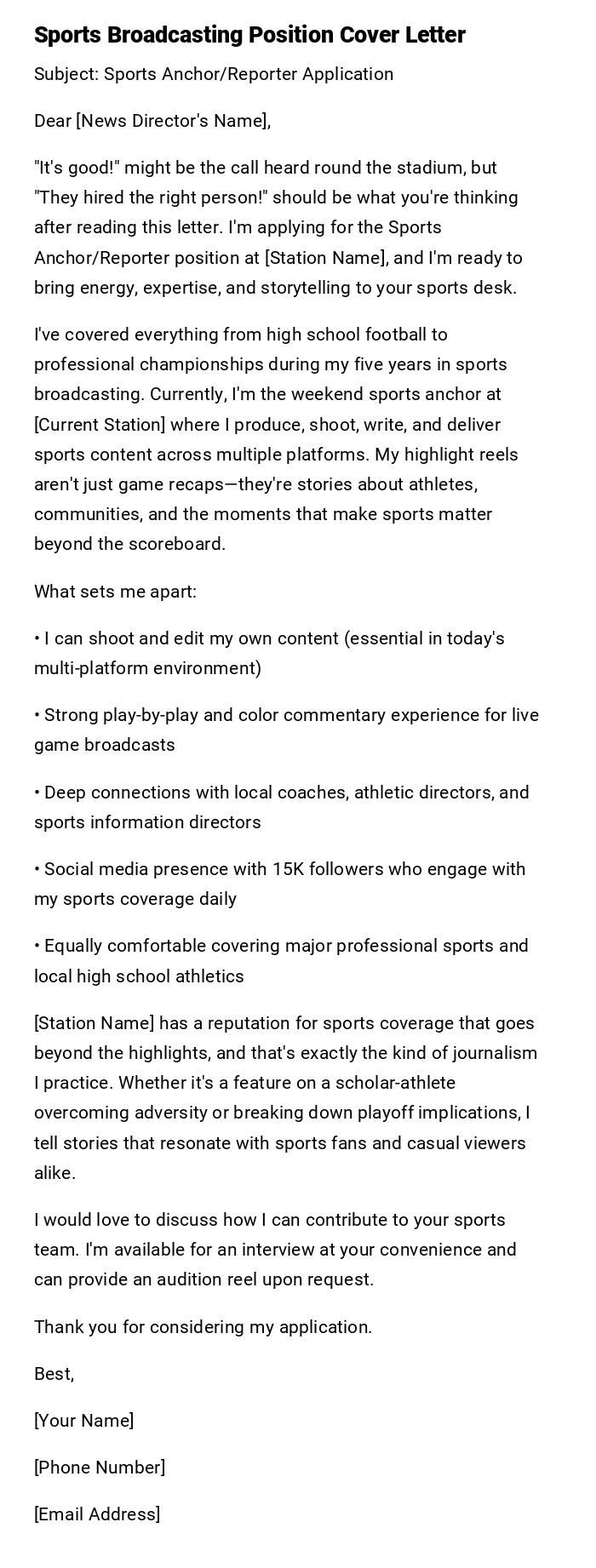
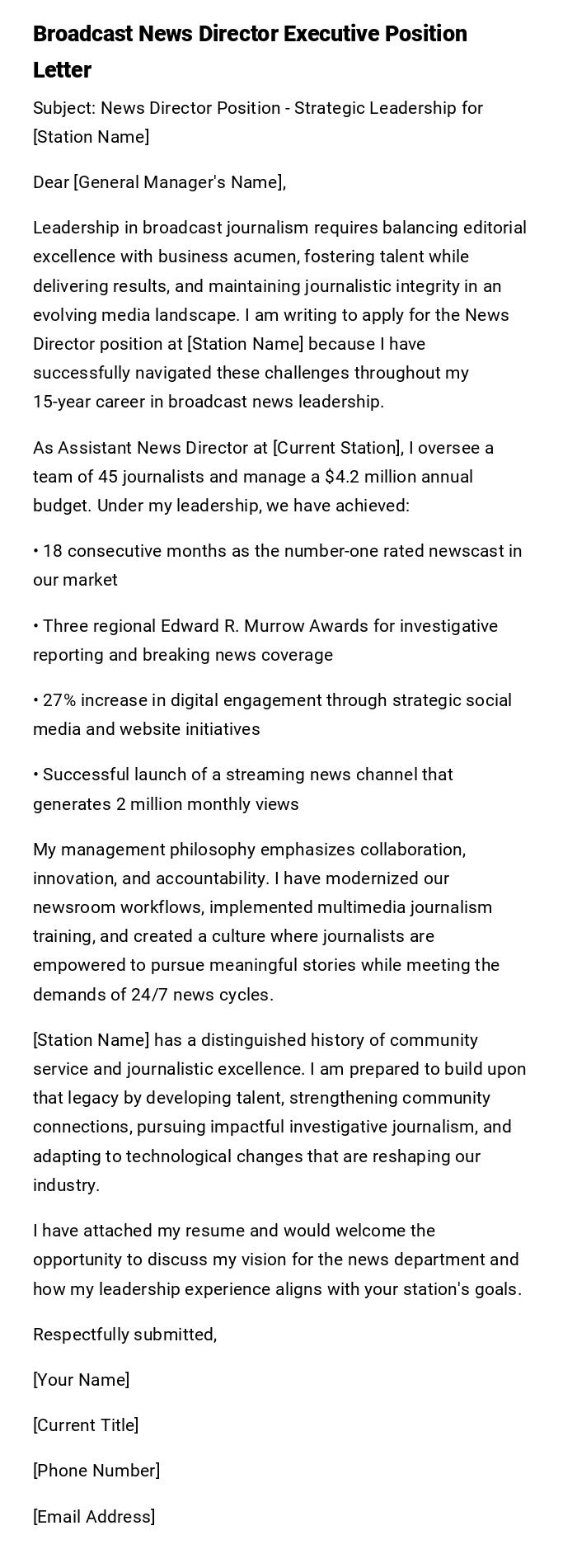

 Download Word Doc
Download Word Doc
 Download PDF
Download PDF